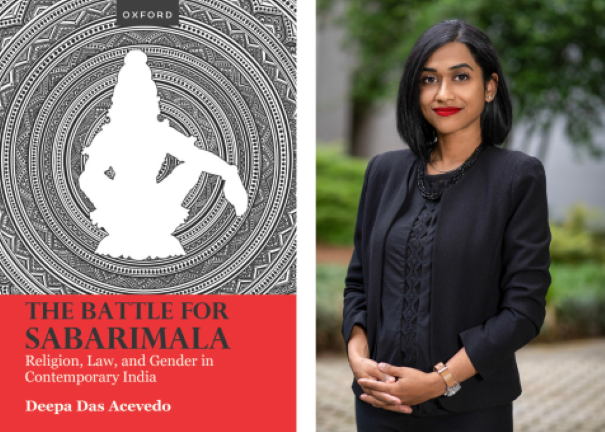The Battle for Sabarimala: Religion, Law, and Gender in Contemporary India
By CSLR | Emory Law | Emory Law | Nov 14, 2023 12:11:57 PM

Date: September 19, 2023
Time: 4:15-5:45PM EST
Location: Hunter Atrium (3rd Floor, Gambrell Hall) OR Zoom (register for link)
Click Here to Register
On September 19, 2023 at 4:15-5:45PM EST the Center for the Study of Law and Religion will host a panel discussion of Emory Law faculty member Deepa Das Acevedo's forthcoming book, The Battle for Sabarimala: Religion, Law and Gender in Contemporary India (Oxford University Press). In addition to Deepa, panelists include Harshita Kamath (Middle Eastern and South Asian Studies), Sameena Mulla (Women, Gender, and Sexuality Studies), Don Seeman (Religion). Dean Bobinski will provide opening remarks.
The following is an abstract of the book forthcoming from Oxford University Press:
The Battle for Sabarimala tells the story of one of contemporary India’s most contentious disputes: a long-running struggle over women’s access to the Hindu temple at Sabarimala. In 2018, the Indian Supreme Court ruled that the temple, which had traditionally been forbidden to women aged ten to fifty because their presence offended the presiding deity, was required to open its doors to all Hindus. The decision in Indian Younger Lawyers Association rocked the nation: protests were launched around India and throughout the diaspora, a record-setting human chain called the ‘Women’s Wall’ was coordinated, and dozens of petitions were filed asking the Supreme Court to review, and potentially reverse, its landmark opinion. Perhaps most significantly, IYLA led the Court to openly reconsider the Essential Practices Doctrine that has been a mainstay of Indian religious freedom jurisprudence since 1954. In this monograph-length study of the dispute, legal anthropologist Deepa Das Acevedo draws on ethnographic fieldwork, legal analysis, and media archives to tell a multifaceted narrative about the ‘ban on women’. Reaching as far back as the eighteenth century, when the relationship between temple deities and the government was transformed by an ambitious precolonial ruler, and coming up to the litigation delays caused by the coronavirus pandemic, Das Acevedo reveals the complexities of the dispute and the constitutional framework that defines it. That framework, Das Acevedo argues, reflects two distinct conceptions of religion-state relations, both of which have emerged at various stages in the—still unresolved—battle for Sabarimala.

